The departure of Kemba Walker illustrates why the Charlotte Hornets rank among the NBA’s least valuable organizations.
Charlotte Hornets fans have had a tough 2019 free agency given the shocking departure of long time point guard Kemba Walker. Walker, who was drafted by Charlotte in 2011, was a consistent— often singular — bright spot for the team from their transition from the Bobcats era to the present.
Despite many seasons of mediocracy, coaching changes, and setbacks, Walker was still willing to re-sign with Charlotte.
With both sides seemingly motivated to reach a new deal, it came as a surprise that negotiations were not only unfruitful, but lackluster. As reported by Stadium’s Shams Charania, the Hornets low-balled their franchise star with a contract nearly $60 million dollars less than what they could have offered him with an exclusive supermax deal.
"The Hornets offer, I'm told, wasn't even really close to the max contract offer of $190M."
— Stadium (@Stadium) June 30, 2019
NBA Insider @ShamsCharania on Kemba Walker leaving his longtime Charlotte organization for a "fresh start" in Boston. pic.twitter.com/uVn7T0xlEw
By letting Kemba walk, Charlotte successfully avoided paying the luxury tax for this coming season. Unlike other leagues, the NBA does not have a hard salary cap. This allows teams to exceed a set payroll if they are willing to cough up funds to pay an additional tax. But in a league where it takes money to make money, could the Hornets’ frugal philosophy be stunting their financial growth?
Paying the luxury tax has long been an action that Michael Jordan and company have not been able to stomach. In fact, according to HoopsHype, the Charlotte Horents, alongside the New Orleans Pelicans. are the only two teams in the league that have never paid the luxury tax.
Consequently, both the Hornets and Pelicans rank among the bottom three of the 2018-2019 Forbes list of NBA team values, just above the Memphis Grizzlies.
More from Swarm and Sting
- Hornets: Where does Brandon Miller’s ceiling rank among other rookies?
- Charlotte Hornets grade out mostly average in position-by-position ranking
- Hornets News: P.J. Washington makes bold statement on Brandon Miller
- Grade the mock trade: Hornets snag Tyler Herro, flip Gordon Hayward
- Will the Charlotte Hornets be in the 2024 NBA Draft Lottery?
This is hardly a surprise, as Charlotte has long been a financial underperformer. From Jordan’s turbulent early years of ownership through today, the Hornets have generally failed in capitalizing on the increasing revenue generated by the NBA.
Although Jordan’s stake was purchased for $175 million in 2011, the current Forbes valuation of the franchise is a bit over $1 billion dollars. Yet, comparatively, the Hornets are clearly underperforming.
Mark Cuban paid $280 million for his stake in the Dallas Mavericks in 2000, about $145 million more than the Hornets’ worth that year, according to Forbes. However, Cuban’s team is now worth somewhere around a cool billion more than Jordan’s team.
The difference? In addition to having a larger market, Dallas has often been willing to pay a hefty price to have a talented team. In the interest of being competitive, Cuban’s club has swallowed the luxury tax nine times — nine more times than Charlotte.
But taking advantage of the soft cap to build stronger squads is not the only way teams have boasted their values. Milwaukee is a closer market comparison to Charlotte than Dallas is, and in fact, hosted a team that was less valuable than Charlotte on Forbes 2014 ranking. That same year the Bucks sold for $550 million.
Although ranked just behind Charlotte as the least valuable team at the time, Forbes reports that Milwaukee has boasted their value by 145% in the past five years to reach today’s $1.35 billion-dollar valuation. Only three teams have had more growth in that time span.
However, this spike in Milwaukee’s financial health is not just because of their draft success and Giannis Antetokounmpo’s stellar play. The Buck’s recently opened a new, $524 million-dollar arena that Yahoo Sports dubbed “The NBA’s most impressive.”
While many teams like Milwaukee have not had a probable chance to win the finals during these last five years, they have been investing large sums of money in their brands through new arenas and max player salaries, often receiving exceptional returns. However, this is not the philosophy of the Charlotte Hornets.
Charlotte’s latest opportunity for investment was also one to rewrite a history of last place and near-last place finishes among franchise valuations. Charlotte’s potential investment came in the form of star guard Kemba Walker.
It is fair to say that the Hornets were in a very rare position for a small market team. They managed to draft a franchise player, keep his interest in re-signing with the team, and were able to offer him a hefty contract that no other team would have been allowed to offer.
Yet the Hornets declined to invest in one of the franchise’s most iconic and beloved players, instead ducking underneath the luxury tax. This move is one of the many examples of the tight-fisted philosophy that has prevented the Hornets from taking the next step as a valued NBA organization.
While paying the NBA’s luxury tax is in no way glamorous, fans have to wonder if incurring the penalty to sign Walker might not only have been worth it to keep their team competitive, but also their brand.
Now, a future with Kemba Walker becomes a hypothetical instead of a reality, as the Charlotte Hornets failed to take advantage of the league’s soft cap for the first time. While the team bets its success on financial cautiousness, Kemba will be wearing more green next year, both in his wallet and on the basketball court.
